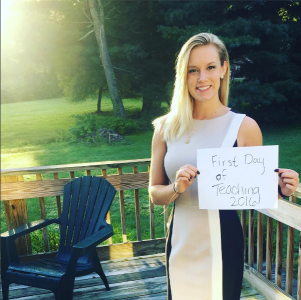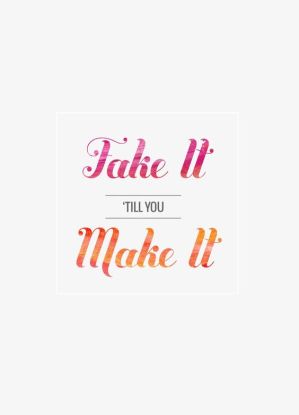For someone who is new to teaching, the entire experience can be pretty intimidating.  After taking a week long training session, preparing my Powerpoints, and reviewing my rosters, the time had come for me to step into my classroom. I took a deep breath and kept repeating my own little mantra, “fake it till you make it.” I put on 90’s alternative music in hopes of alleviating some of the first day awkwardness. As students trickled in I pretended to be busy, shuffling around papers, refreshing my email every few seconds, and
After taking a week long training session, preparing my Powerpoints, and reviewing my rosters, the time had come for me to step into my classroom. I took a deep breath and kept repeating my own little mantra, “fake it till you make it.” I put on 90’s alternative music in hopes of alleviating some of the first day awkwardness. As students trickled in I pretended to be busy, shuffling around papers, refreshing my email every few seconds, and
occasionally looking up and smiling. Once the door had shut, everything appeared to fall into place.
Words flowed fluidly out of my mouth and a few students even laughed at my jokes, something I now realize is rare on the first of the semester. I wrapped up a few moments early and the students quickly made their way out of the small classroom.
As the semester progressed, I got better and better at getting my students involved in discussions. They began talking more within their small groups, answering questions without hesitation when I posed them, and even began initiating small talk with me before the class began. My goal before the semester had begun was to make my class as enjoyable for the students as possible. I wanted it to be a class that they didn’t dread and didn’t feel like they were stuck doing busy work for. From my SPOT evals, I think I achieved that.
While going through the assigned readings for Contemporary Pedagogy, the question “what kind of educational experiences change lives?” kept popping back into my mind. I started to think about the classes that I enjoyed during my undergrad and what they all had in common. To my own surprise, a majority of them were writing intensive (something I don’t typically enjoy) and as most writing intensive classes are, they were relatively small in size. But that wasn’t what I liked most about the courses. What I remembered specifically was how much I enjoyed those classes because of my professors. Their teaching styles first and foremost were founded on mutual respective, they were almost always available to meet on and off campus, and they taught us about life and not just the material. I enjoyed going to those classes because it was a safe place to share ideas and opinions, openly discussing different views and perspectives without fear of judgment. My favorite professors were humans with flaws, senses of humor, and kindness within their hearts. That’s the type of teacher and leader I want to be. I want to make an impact.
But how does one go about making an impact? According to Tim Hitchcock, the best way to go about making an impact is by expanding your audience via social media platforms like Twitter and blogging. My immediate reaction to this is “oh no, I’m not really into Twitter and blogging is a hobby I just never seem to be able to commit to.” I don’t know if this is due to a lack of confidence in my writing ability or if I just never seem to be able to think of something interesting enough to really put out there. Most likely a combination of both. Though I am a little reluctant to this mandatory blogging, I’m hoping this course will help to alleviate some of that disinclination. I guess we’ll see.


I really love your story of your first day of teaching – as well as your picture. I’m definitely going to have to do that too my first day. 🙂 I also totally agree with your assessment of the classes you most enjoyed. It’s the professors who treat you like real people and act like real life people themselves that I really learned the most from and was the most engaged. I’m a little reluctant too of blogging and using social media in the class room so I’m excited to experience & learn different ways to possibly use it in the future.
LikeLike
I also really enjoyed the story of your first teaching experiences! It sounds to me like your students are fortunate to have you in charge and that it went really well — partly because you intuitively modeled the kind of teaching that you found most valuable. The styles and subjects might vary, but the experiences that stuck with you were the ones where the teacher was engaged – s/he invested in you as a student and as a human being – and passionate about the material. And that’s pretty much a fool-proof combination!
I realize blogging doesn’t come easily for everyone, so thanks for giving it a try. It does give us a chance to exchange ideas and work through the material beyond the Wed. 6-9 window. And I hope it will make our work in class even more rewarding.
LikeLike
Your mantra should be one they should teach us in kindergarten and never let us forget.
Seriously.
Because everyone I know that seems like they know what they’re doing, only does so because of failing so many times that they know exactly where all of the slippery rocks are or actually has literally no idea what they’re doing. But every day they put on a brave face and dive into the cold water head first hoping no one notices. What I’ve learned is that your students and people working for you are so worried about themselves that they wont even notice unless you make it painfully obvious.
Also, I loved your story and how it leads effortlessly into your philosophy about balancing being liked and getting good reviews while still being an effective educator. But my question to you is how do you think you can take blogging, tweeting, and other social media from being a hobby that may be a potential distraction and use it to perhaps keep the in-class conversations going beyond the class room?
LikeLike
Really great post! I too enjoyed reading the story of your first day. I think you’ve highlighted a crucial question we should all be asking ourselves. What kind of educational experiences do change lives? This is something to seriously reflect upon, especially as it pertains to today’s day and age. I don’t necessarily agree with Tim Hitchcock that social media is the best way to make an impact. I think it is a useful tool, but not necessarily the most effective. In my opinion, educational experiences are not solely confined to those that take place in a classroom on online discussion forum. Life changing educational experiences take place every day, every where, and in every context. What makes these experiences the “life changing kind” is networked learning. Networked learning is defined as a process of developing and maintaining connections with people and information, and communicating in such a way so as to support one another’s learning (https://en.wikipedia.org/wiki/Networked_learning).
So, in my opinion, educational experiences that allow us to communicate, thus supporting MUTUAL learning, are the experiences impactful enough to change lives.
LikeLike
Though I do agree with Tim Hitchcock that social media is the way to make the biggest impact, I don’t know if necessarily makes the most important impact. It seems almost a quality vs. quantity when dealing with students. They learn better and think more critically about information in-person. Sometimes students are on social media so much they don’t really understand that isn’t how the whole world works. I think having teachers that don’t utilize social media to interact with students will be a rare blessing in the future.
LikeLike
Based on my experience, the biggest impact of motivating learning is the caring of the instructors and in-person interactions with them. Although social media is a convenient and quick way to reach them, but the communication is quite superficial as I feel.
LikeLike